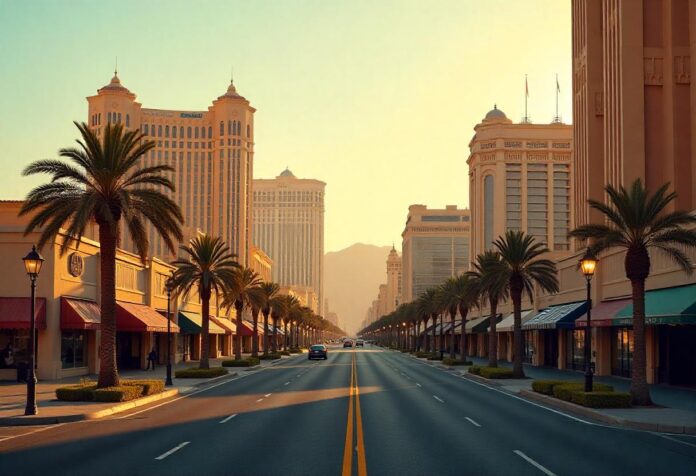Las Vegas Tourism Faces a Slight Decline During Fourth of July Weekend
Las Vegas, the glittering oasis of entertainment, is preparing for a Fourth of July weekend that, while still vibrant, will see a slight dip of 1% in tourism compared to last year. Visitor numbers are projected to fall from 344,000 in 2024 to 340,000 in 2025, marking a notable shift in the city’s bustling tourism landscape. This decrease can be attributed to several economic factors, including ongoing inflation and an availability crunch in hotel accommodations—all significant contributors to the decline in hotel occupancy during this festive period.
Visitor Projections and Hotel Occupancy Trends
According to the Las Vegas Convention and Visitor Authority (LVCVA), the expected drop to approximately 340,000 visitors reflects broader changes in consumer behavior. It appears that economic uncertainties are leading many to rethink their travel plans, especially for a holiday typically characterized by high travel numbers. With more than 150,000 fewer hotel rooms available compared to last year, the expected hotel occupancy rate stands at around 93.1%, a decrease from 94.4% in 2024. This subtle decline underscores the shifting dynamics of Las Vegas tourism, shaped by fluctuating market conditions and consumer confidence.
Economic Impact and Consumer Spending
Despite the anticipated lower number of visitors, Las Vegas is set to experience a rise in consumer spending—the LVCVA forecasts direct spending will reach about $449.5 million, increasing by 3.7% over last year. This uptick can mostly be attributed to inflation, which has led to increased prices across various sectors, including hospitality, dining, and entertainment. Interestingly, while consumer spending sees a rise, the overall economic impact is projected to dip slightly by 0.2%. Such trends suggest that visitors may be spending more per transaction while the total amount of tourist traffic remains subdued due to financial hesitations.
A detailed look at recent tourism data reveals a general decline in visitors, with a reported 6.5% drop from May 2024 to May 2025. Visitor numbers fell from 3.65 million to 3.41 million. Influencing factors include heightened concerns over economic conditions, including volatility and potential recessions, which also led to an 11% drop in gaming revenue and a decrease in average hotel room rates from $125 to $109.
Shifting Travel Patterns and Cost Considerations
The Fourth of July holiday typically garners high travel traffic, as Americans embrace the extended weekend for leisure activities. However, rising inflation is reshaping how many travelers approach their budgets and spending. The economic environment has pushed some tourists to alter their plans, opting for more budget-friendly experiences or vacations closer to home.
On a more positive note, there’s good news for road-trippers: fuel prices are expected to be about 30 cents lower per gallon than last year. This decline may incentivize visitors from surrounding regions to journey to Las Vegas, indicating that while some travel plans are curtailed, others continue to thrive.
Attractions and Events Amid Challenges
Regardless of the slight downturn in tourism, Las Vegas continues to shine brightly as a premier destination. The city boasts a vibrant mixture of attractions, from its world-renowned casinos and high-end shopping options to an unbeatable nightlife scene and critically acclaimed shows. Notably, to celebrate the Fourth of July, several hotels are planning spectacular fireworks displays. Caesars Palace, for instance, is slated to host a dazzling fireworks show at 9 p.m. on Friday. Such events play a vital role in maintaining Las Vegas’s allure, drawing visitors eager for an unforgettable holiday atmosphere.
Adapting to an Evolving Tourism Landscape
While Las Vegas has faced challenges recently—such as decreased tourism during significant events like Super Bowl LIX in February—the city is noted for its resilience. A considerable 12% drop in visitors during the Super Bowl weekend highlighted the competitive nature of the tourism sector and evolving influences on travel decisions. Nevertheless, Las Vegas continuously adapts, welcoming new developments designed to captivate both returning and first-time visitors alike.
Significant infrastructure expansions are underway, with new hotels, entertainment venues, and attractions consistently being introduced to cater to diverse tastes and budgets. This constant evolution ensures that Las Vegas retains its status as a leading destination, adapting to both traditional and emerging travel preferences.
Embracing Future Potential
As the city navigates through fluctuating tourism numbers, Las Vegas remains steadfast in its position as a key player on the global travel stage. The unique blend of luxury, entertainment, and unparalleled excitement ensures that it continues to attract visitors year after year. As the tourism landscape shifts, Las Vegas harnesses this moment to innovate and diversify its offerings, ensuring its enduring appeal remains intact.
While the upcoming Fourth of July weekend might present a more modest turnout, the future for tourism in Las Vegas looks promising. The city’s ability to pivot in response to economic fluctuations and changing consumer behaviors ensures it will continue to be an iconic destination for years to come.
